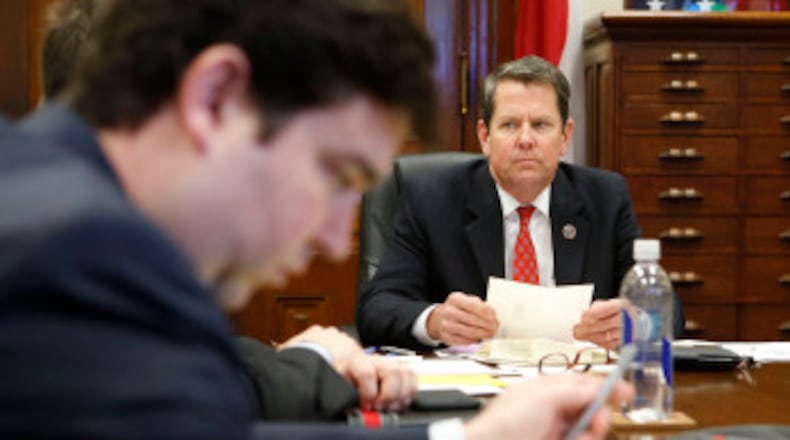Secretary of State Brian Kemp, whose campaign for governor hinges on drawing huge support in rural Georgia, released his most detailed plan to help struggling parts of the state.
Kemp's "New Day in Rural Georgia" initiative calls for tax breaks to prod the expansion of high-speed Internet across the state, more incentives to spur small businesses to take root in rural Georgia and an aggressive new approach to market the state's agriculture industry.
“People feel they’re being left behind, that politicians in either Capitol – Atlanta or Washington - aren’t fighting for them. I know different,” said Kemp, who vowed to pass “pro-rural legislation” in his first 100 days in office.
He is facing four leading Republican contenders – Lt. Gov. Casey Cagle, former state Sen. Hunter Hill and state Sen. Michael Williams - in the race for Georgia governor. The winner will face one of two Democrats: former Georgia House Minority Leader Stacey Abrams and ex-state Rep. Stacey Evans.
Cagle had earlier outlined his plan to expand high-speed Internet, which is a central part of his campaign as well.
Kemp's initiative would eliminate the state sales tax on high-speed Internet equipment for rural counties and state fees for the right of way for online providers. He would also explore tax incentives for tech companies that invest in Internet expansion in rural areas.
The plan also called for a new strategy to push Georgia crops, in part by taking the “Georgia Grown” marketing push international. Kemp would also expand the state’s system of inland ports – massive logistics hubs – and organize trips to places like California to try and recruit farmers and agriculture firms.
“I’ll be a governor that celebrates 50 jobs in Bainbridge just like I’d celebrate 500 jobs in Buckhead,” said Kemp.
To spur job growth, Kemp would call for the economic development team to assign a “strike team” to partner with local officials and universities to plot out business opportunities. And he would expand tax credits for employers who provide transportation for staffers as well as workers who carpool.
The governor’s office would get a new “military liaison” and a pilot education savings account initiative – an idea Hill has long pushed in the Senate – for military families under his plan. And health providers who set up shop in rural parts of the state would get a host of new tax incentives.
“Some people in rural just don’t feel like there’s someone in Atlanta fighting for them,” he said of his plan. “But they know I’ve been there multiple times and that I understand their issues, that I’m just as comfortable on a backhoe as in a boardroom.”
Kemp’s plan comes as he’s facing new scrutiny of his office’s role in a lawsuit alleging widespread issues with Georgia’s voting machines. Public polls, as well as internal ones released by the campaigns, show Cagle with a wide lead and a brewing race for a second spot in a likely runoff next year.
Read more recent AJC coverage of the governors race:
Candidates for governor are showing rural Georgia some love
'Religious liberty' could have impact on Georgia's Amazon effort
Williams steps up his embrace of medical marijuana
Georgia candidates seeking voters see gridiron as a golden opportunity
Democratic forum previews a fight for 2018
Georgia gov hopeful gets heat over response to Las Vegas shootings
Democrats in Georgia governor's race push gun limits
Georgia governor race: Who is running in 2018
New relationship brewing between Georgia Republicans, alcohol
A divide over the two Staceys has Georgia Democrats worried
Governor’s race revives a familiar feud between Kemp, Abrams
About the Author
The Latest
Featured




